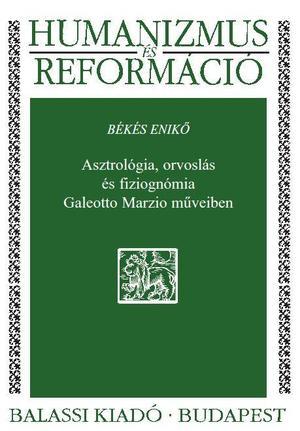New book by Eniko Bekes: Asztrológia, orvoslás és fiziognómia Galeotto Marzio műveiben [Astrology, Medicine and Physiognomy in the Works of Galeotto Marzio]

Eniko Bekes (MA'03): Asztrológia, orvoslás és fiziognómia Galeotto Marzio műveiben [Astrology, Medicine and Physiognomy in the Works of Galeotto Marzio], Budapest, Balassi kiadó, 2014.
The present study aims to analyse and contextualise Galeotto Marzio's tract De doctrina promiscua, which is dedicated to Lorenzo de Medici. In particular, Galeotto's chapters on astrology, medical astrology, the history of sexuality and physiognomy are in the focus of the present discussion, since previous research has largely ignored them. This interpretation lays special emphasis on exploring the interrelations which might have existed between the literary topoi the author uses and the addressee's endeavours for self-representation. The readings pursue an interdisciplinary approach and, accordingly, also strive to consider correlations between the ideas of natural philosophy under discussion and fine arts, political theory or literary motifs. Both the topic choice and general approach of this volume affiliate it with the research trend which has become widely known lately under the designation of "intellectual history" and aims to examine together literary, political and philosophical texts, just as well as medical and astrological ones. Therefore, the fundamental goal of the study is to present a certain contextualist reading of Galeotto's work. The genre and thematics of a tract on natural philosophy also require this approach, since subjecting this pronouncedly non-literary text to aesthetical analysis would hardly be possible.
The in-depth analysis of De doctrina leads to the conclusion that Galeotto's work with its predominant focus on topics of medical astrology, astronomy and pharmacology is fundamentally based on Aristotelian natural philosophy, Galenic physiology, and their Arabic and Padovan reception hallmarked by Avicenna's and Pietro d'Abano's names, respectively. Furthermore, Galeotto was deeply influenced by the astrological thinking equally retraceable to classical Greek and Roman sources and Arabic scientific writing. Within this, Galeotto's tract reflects primarily not so much the hermetic-magical-Neoplatonist trend represented by Ficino, but rather Paduan thought rooted in d'Abano's legacy.